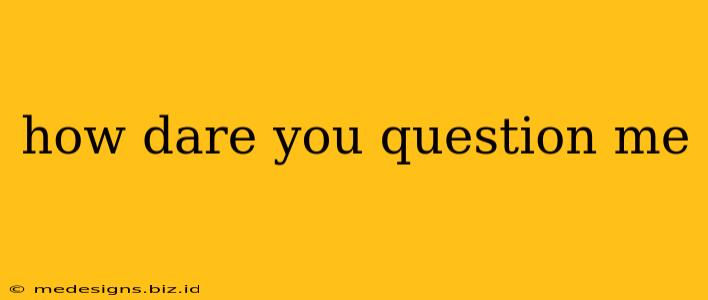How Dare You Question Me? A Look at the Psychology of Defiance
The phrase "How dare you question me?" speaks volumes. It's not just a question; it's a statement of power, a declaration of authority, and often a veiled expression of insecurity. But what lies beneath the surface of this seemingly simple phrase? Let's delve into the psychology behind this potent statement.
The Roots of Defiance: Power Dynamics and Insecurity
The utterance "How dare you question me?" often arises from a perceived threat to one's authority or position. The person questioning may be challenging established norms, hierarchies, or even the questioner's self-image. This perceived threat triggers a defensive mechanism, leading to the outburst.
-
Power Plays: In many cases, this phrase is used as a tool to assert dominance and control. The speaker seeks to re-establish their perceived superiority by silencing the questioner. This is especially true in environments where power dynamics are already tense or unclear.
-
Fragile Ego: Ironically, the phrase can also stem from insecurity. The speaker might feel their competence or knowledge is being challenged, leading to a defensive reaction to protect their ego. The outburst is a desperate attempt to maintain a facade of confidence.
-
Fear of Accountability: The question itself might expose vulnerabilities or shortcomings. The speaker may instinctively react defensively to avoid confronting the potential consequences of being questioned. The outburst serves as a distraction from the uncomfortable truth.
Understanding the Context: Deconstructing the Phrase
The meaning and impact of "How dare you question me?" vary significantly depending on the context. Consider these scenarios:
-
Formal Setting: In a professional environment, such a statement might be perceived as aggressive and unprofessional, damaging relationships and hindering collaboration.
-
Informal Setting: Among close friends or family, the phrase might be less serious, possibly even playful or teasing, depending on the relationship dynamics.
-
Emotional State: The speaker's emotional state heavily influences the interpretation. If uttered in a moment of stress or anger, it carries a far different weight than if said calmly and deliberately.
Responding to "How Dare You Question Me?"
How you respond to this phrase depends on the context and your relationship with the speaker.
-
Direct Confrontation: In some cases, a calm and measured response directly addressing the underlying concerns might be effective. For instance, "I understand you feel challenged, but my question is intended to clarify..."
-
Diplomacy and De-escalation: Sometimes, choosing to de-escalate the situation is crucial. Responding with understanding or changing the subject can prevent further conflict.
-
Setting Boundaries: In instances of repeated aggressive behavior, setting firm boundaries is essential. This might involve disengaging from the conversation or seeking mediation.
The Takeaway: Understanding the Underlying Emotions
The phrase "How dare you question me?" is more than just words; it's a window into the complex interplay of power, insecurity, and emotion. Understanding the underlying motivations behind this seemingly simple statement can help us navigate challenging interactions and build healthier communication patterns. Ultimately, recognizing the vulnerability often hidden behind such a defensive posture fosters empathy and promotes productive dialogue.
